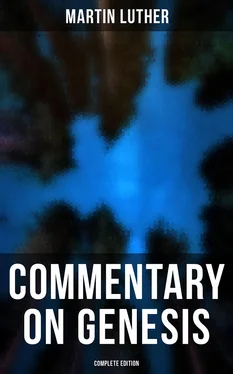Martin Luther - Commentary on Genesis (Complete Edition)
Здесь есть возможность читать онлайн «Martin Luther - Commentary on Genesis (Complete Edition)» — ознакомительный отрывок электронной книги совершенно бесплатно, а после прочтения отрывка купить полную версию. В некоторых случаях можно слушать аудио, скачать через торрент в формате fb2 и присутствует краткое содержание. Жанр: unrecognised, на английском языке. Описание произведения, (предисловие) а так же отзывы посетителей доступны на портале библиотеки ЛибКат.
- Название:Commentary on Genesis (Complete Edition)
- Автор:
- Жанр:
- Год:неизвестен
- ISBN:нет данных
- Рейтинг книги:4 / 5. Голосов: 1
-
Избранное:Добавить в избранное
- Отзывы:
-
Ваша оценка:
- 80
- 1
- 2
- 3
- 4
- 5
Commentary on Genesis (Complete Edition): краткое содержание, описание и аннотация
Предлагаем к чтению аннотацию, описание, краткое содержание или предисловие (зависит от того, что написал сам автор книги «Commentary on Genesis (Complete Edition)»). Если вы не нашли необходимую информацию о книге — напишите в комментариях, мы постараемся отыскать её.
Commentary on Genesis is the last work of Martin Luther, written during the last several years of his life. Luther's work follows the first volume of Psalms with critical and devotional remarks on the creation and on sin and the flood.
Commentary on Genesis (Complete Edition) — читать онлайн ознакомительный отрывок
Ниже представлен текст книги, разбитый по страницам. Система сохранения места последней прочитанной страницы, позволяет с удобством читать онлайн бесплатно книгу «Commentary on Genesis (Complete Edition)», без необходимости каждый раз заново искать на чём Вы остановились. Поставьте закладку, и сможете в любой момент перейти на страницу, на которой закончили чтение.
Интервал:
Закладка:
But I add, for the sake of those who do not understand this, that in the Scriptures the word heaven often signifies what we call the horizon. Hence the whole firmament is called the heaven of heavens, in which are gathered the heaven of all human beings; that is, the horizon. In this respect we have a different heaven here in Germany than the people in France or Italy. But this name helps nothing at all in the explanation of our text. Therefore the greater number of theologians interpret here waters, as also indicated above, the glacial heaven, the cold heaven, which is located where it is that it may moisten and refresh the lower sphere in their great and swift motion, lest they be consumed by their excessive heat. But whether they have thus concluded correctly, I will leave unanswered.
I freely confess that I do not know what kind of waters these are. For the old teachers of the church did not specially worry about this, as we see Augustine condemned all astrology. Although it contains much superstition, yet it should not be entirely despised, for it is wholly given up to the observation and consideration of divine themes, a zeal and diligence most worthy of human beings. Therefore we find that many most highly talented and excellent persons have exercised themselves in astrology and obtained pleasure from it.
Sufficient has been said on this subject to show that on the second day the heaven was separated and located so that it stood in the middle between the waters.
III. But here another question presents itself. To the works of all the other days there is added the divine sentence of approbation, "And God saw that it was good." How is it then that the same sentence is not added to the second day's work, when the greatest and most beautiful part of the whole creation was made? To this question it may be replied, that this same divine sentence is added at the end of the creation of all things on the sixth day and more fully expressed thus, "And God saw everything that he had made, and, behold, it was very good." And these words apply to the heaven also.
Lyra is inclined to think with Rabbi Solomon, that as this divine expression, "And God saw that it was good," is uttered twice during the third day's work, one of the divine sentences refers to the second day's work; which was perfected on the third day, when the waters which are "under" the heaven were more distinctly divided from the waters which were "above" the heaven. But it is by far the safest way not to be too curious and inquiring on these subjects; because they exceed our human capacity.
Others speculate here and give reasons they understand not, that the second number is of an evil omen, because it is the first number that departs from the unity of God, but God was displeased with this digression and approved of the unity, and therefore he did not add the clause "it was good" on the second day. Lyra is however right in calling this a misleading and dangerous explanation. For in this manner all the numbers depart from the Unity.
Therefore it is far the safest not to be too curious and inquiring in these subjects, because they are placed above our human capacity. For how can we understand that order which God himself establishes and approves. Yes, reason must here be put to shame, for what is order in the eyes of God we judge to be the confusion of order. Thus the stars seem to us to be arranged thoughtlessly in wild disorder in that the bright ones are scattered among those more obscure, and the lesser among the greater. Who would judge this to be order? And yet it is the most perfect harmony, so constituted by the all-wise mind itself. In like manner we judge of other matters. It seems confusing that our Elbe and all rivers flow to the sea in an irregular winding course. Such disorder there seems to be also among trees, yes, between man and wife, where it appears there is no order. But all this only proves that God is a God of order and that his judgment as to order is quite different than ours.
We therefore cease to follow more curiously the question why God added twice to the third day, "And God saw," etc., and omitted it on the second day. Nor will we conclude rashly whether the work of the second day was finished in the third day or not. Philosophers have handed down the rudiments of the arts and of the science of astronomy, and in doing so they divided the heaven into various spheres. We have a much simpler theory or science, in that we at once make God the immediate Creator of all things by his Word, Dixit , "And God said."
For how can we understand that order which God approves as such? Nay, our natural reason must here of necessity be confounded; for that which is order with God is in our judgment confusion. Hence the stars appear to us to be in a state of wild disorder; the bright being mingled with the more obscure, and the lesser with the greater. Who would judge this to be order? And yet it is consummate harmony; and so constituted by the all-wise Mind. And so we judge of other things. Our river Elbe seems a confusion; as do all other rivers also; because their streams empty themselves into the sea by winding courses. In the same manner trees seem to present a confusion. Nor do males and females in the world and their unions and combinations appear to be a state of order. All here also as to the appearance of things is disorder and confusion. All these things therefore unitedly prove that God possesses an order, and judges of it, differently from ourselves.
Cease we therefore to penetrate into these things with too much curiosity, why it is that God repeats the divine sentence in question twice during the work of the third day and omits it altogether in the work of the second day? Nor determine we rashly whether the work of the second day was finished on the third day or not. Philosophers laid down the rudiments of the arts and of the science of astronomy; and in so doing they divided the heaven into its various spheres. But we adopt a simpler and more true method of procedure and judgment; for we at once make God the immediate Creator of all things by his Word, "And God said."
Part III. God's Work on the Third Day
Table of Contents
I. V. 9a. And God said, Let the waters under the heavens be gathered together unto one place.
In the foregoing I observed that we do not understand the order of the works of God. Had he therefore asked us our opinion here we should have advised him to use such an order as to add the sentence now in question to the work of the second day. But God will ever be master of his own order and the ruler of the world. Wherefore we ought not to be over curious here. The text plainly declares that God commanded the waters "under the heavens to be gathered together unto one place." It does not say as before, V. 7, "under the firmament," where it is said, and God divided the waters which were "under the firmament" from the waters which were "above the firmament."
The heavens therefore, according to the phraseology and definition of the Scriptures, are the whole of the higher region and its machinery, together with the entire body of the air and all its spheres. The Hebrew name is derived from the material of which it is composed; namely, from that confused body of water, by the extension or expansion or multiplication of which it was formed. For that first body of unformed water was not so extensive in itself, but was so expanded or spread out by the Word. Just as Christ, according to the record of the Gospel, so multiplied a few loaves by his blessing as to make them suffice for a great multitude of men.
What therefore we philosophically call the air, with all its spheres, Moses here calls the heavens.
But by waters he means the waters of our seas and rivers, which were also formed out of that original unformed mass of water; or out of the dregs or lees of it, as it were, after the heavens had been formed or expanded out of it by the Word. I believe however that the nature and power of our water are far inferior to those of the heavenly waters. For our waters are, as I have said, the dregs, as it were, of the higher waters. So that they may be said to have been gathered together not only as to their place or position, but as to their body or substance, because these latter waters are heavier than those of the air or heaven. For we can breathe in the air, but we cannot breathe in the water.
Читать дальшеИнтервал:
Закладка:
Похожие книги на «Commentary on Genesis (Complete Edition)»
Представляем Вашему вниманию похожие книги на «Commentary on Genesis (Complete Edition)» списком для выбора. Мы отобрали схожую по названию и смыслу литературу в надежде предоставить читателям больше вариантов отыскать новые, интересные, ещё непрочитанные произведения.
Обсуждение, отзывы о книге «Commentary on Genesis (Complete Edition)» и просто собственные мнения читателей. Оставьте ваши комментарии, напишите, что Вы думаете о произведении, его смысле или главных героях. Укажите что конкретно понравилось, а что нет, и почему Вы так считаете.












